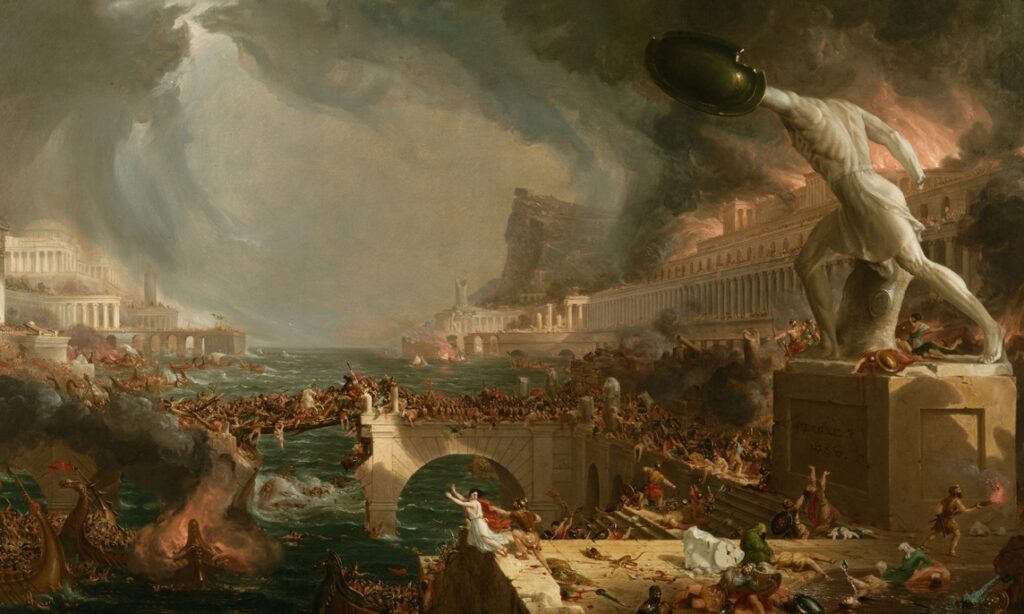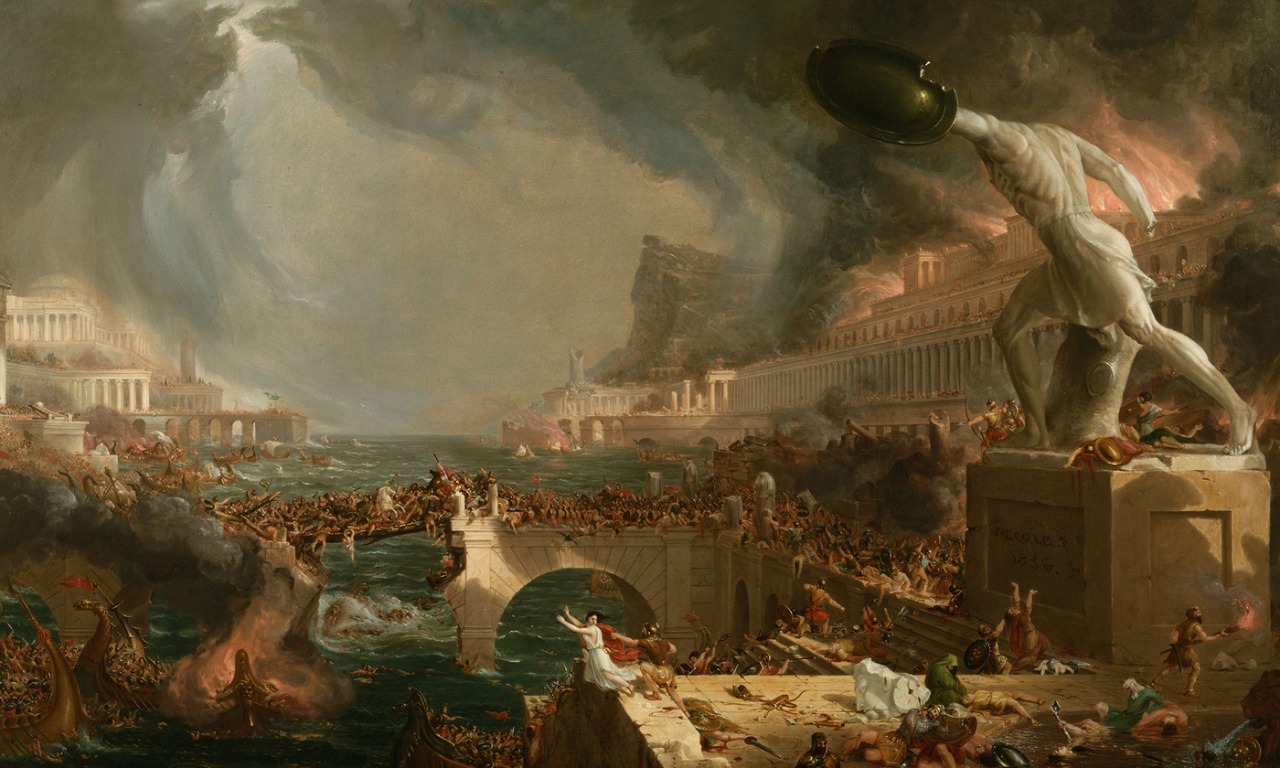
The Roman Empire was politically and socially massive. It included most of Europe, North Africa, and much of the Middle East at its peak. Its spectacular network of roads contributed to the social unification of the areas under its rule, which shared a common language and, subsequently, a common religion. The western half of the Roman Empire was destroyed by barbarian invasions in 476 A.D. In comparison, the eastern half resisted the onslaught of the Religion of Peace until 1453 A.D., when Constantinople, the so-called “New Rome,” was captured after a long and deadly siege. With the fall of Constantinople, the Roman Empire’s long and illustrious history came to an end. However, the empire’s contributions lasted long after its political framework had crumbled. Being powerful, it had an effective system, and it conquered and assimilated many cultures. It made them visible to the outsider.
The establishment of a little city-state in a remote corner of Italy, however, was an implausible scenario. Rome could have easily never ascended to become a global power, and the world would be a very different place today. History tends to conceal itself through monuments, diary entries, letters, and relics. If it wasn’t as we know it today, would our lives be the same? What if our present could be altered with the snap of a chalk? Would history weep over the loss of one of the greatest empires? Only Marcus can say as he goes back to an alternative past of the Roman Empire.
Another tiresome day begins, starting with history in the first period. High school is a nightmare for everyone, especially the batch of 2021 with masks as an additional carry-on. Humanities isn’t an easy subject; others mock us. To have an in-depth analysis of the socio-psycho-political world, our classroom was entitled heaven. How could we forget the dead? History has got your back here, with an exact word-to-word analysis of the Roman Empire, which changed so much.
“I wished it didn’t even exist,” I yelled the minute I took my seat. Frowning over the pages of the big textbook until I reached the dreaded Roman Empire. As the class ended with 40 minutes gone down the drain, I walked up to our professor. He was so infectiously energetic and excited with the beginning of the new chapter that my newfound hatred just grew, only for me to blow up on him and insult a whole empire for existing and adding pages to our textbooks.
The professor smirks, “If you wish the empire dead so badly, why don’t you live your dreams?” The professor snaps his yellow chalk in half, and the world around me dissolves.
It was as if the textbook came to life; the paintings and not-so-creatively-used words from the text jumped out to describe the place that now stood tall ahead of me. The missing pollution and lack of jeans as acceptable clothing was overwhelming, and I blacked out. When my eyes opened, I found myself lying in a relatively modest living quarter. So I sit up and analyse, like a good student at a museum.
Then I hear some voices; surprisingly, I understand bits and pieces of what the lady taking care of me has to say, “The lad seems rather weird-looking. Wonder where he is from.” She sits beside me, pointing at the food that I proceed to wolf down in seconds. The lady sits down as her child runs in, glances at me and rushes into her arms.
“Mother, tell me the story again, of great-great-grandfather and his trip to hell.” The child sits down, ready to listen. I lend my ear, my ancient languages’ extra classes paying off its debt at this moment. She begins a long story which coincidentally I had heard just that morning—The Battle of Allia or, in a little more detail, the sacking of young Rome by the Gallic Celts, 387 B.C.
My heart stopped for several seconds and I hoped I was dreaming, before I heard the lady talk worriedly about the Punic War. I lost all sense of time, but I kept silent, pretending to be wolfing down another plate as I listened to her explain the war, to bring back some sense of my timeline and place.
My only guess was this being an alternate timeline. A timeline where the Romans’ march to imperial grandeur was far from assured, and Rome came dangerously close to extinction on several occasions. An antithesis of what I had learnt—the Gauls pillaged and conquered Rome in its early history.
As I delved into this bizarre timeline of events, I was compelled to unlearn and learn again. Around 400 B.C, Carthage had begun its expansion across the Mediterranean, and the Greeks and Etruscans sustained their civilisations of city-states. The Etruscans culturally dominated the North, while Greek colonists controlled the southern tip of the peninsula. Alexander the Great still began his conquest of the entire known world at that time. Civilisations still expanded, while Rome’s influence was completely erased.
From what I had known, for the western civilisation, the ongoing Punic Wars were a turning point, breaking out on the island of Sicily in 264 BCE. The woman said to her child, “Carthage has come close to annihilating Rome in its entirety. After the Gauls, they cannot sustain another invasion.” And she was correct. Without Rome, Carthage would be left to colonise most of the western Mediterranean—effectively changing the region by themselves. In another set of events, the kingdom of Mithraedes, Greece and Macedon, Egypt, had succeeded in halting the rise of the greatest empire modern-day history has known. The Roman Republic and Ancient Carthage were to fight a battle that would last further, for over half a century.
As I write this, I must have lived two lives in an alternative universe where I saw the Romans slowly lose a battle that defined the course of events. Over 50 years, I witnessed the end of the longest war contested overseas. During this period, I fell through periodic changes in my life, from being lost to finding my way through an ancient lifestyle. With Rome losing the war, the condition deteriorated. Lifestyle was different, and finding a way through wasn’t easy, especially given my old age; I took my last breath, reliving the magic of my alternate life. Little did I know this wasn’t the end.
After Marcus’s demise, there were a lot more intricacies to this alternate timeline. Rome wasn’t destined to be the most extensive empire. It was, essentially, a long history of arduous decisions and wars that made it so. In this timeline, single defeat, a single what-if, had irreversibly altered the trajectory of world history — it had a cascading effect.
Rise of Carthage and Other Rulers
With the defeat of Rome, Carthage would take over with tactics of extending connections through trade; Carthage conquered for riches, unlike Rome, which defended through their military. It isn’t just Europe; the Mediterranean sea would be divided between Carthage and the Greeks. Over the years, Alexander would move on his conquest to dominate the world, with other civilisations expanding as the influence of Rome would be missing. While in Italy, with no binding force, it would continue to be a divided mess, and progress strained. Eventually, the North of Europe would split into numerous tribes. At the same time, the Celts in south Germany would spread out further to Portugal and even central Anatolia. The Gaelic war would wound Ireland. With the chaos at its peak and no uniting force like the Romans, Carthage takes advantage. Today, the kingdoms we associate with medieval northern Europe would not exist, leaving a few tribes influenced by faraway kingdoms.
Language
One of the Roman Empire’s most important contributions was a common linguistic heritage that shaped and strengthened modern European languages, including English. Britain would never have come into contact with Latin or English if it hadn’t been for the Roman Empire.
Fate of Christendom
The running theme with the Celts, Gauls, British, Germans, and Scandinavians being far more isolated would continue in an alternate timeline. Christianity flourished throughout the Roman Empire from its beginnings in the Holy Land. Roman highways were utilised by missionaries to evangelise the empire’s cities. In the absence of its empire, a more connected Mediterranean world would share certain gods. Without a Roman empire, Celtic lands would have controlled large portions of Europe. Their Gods were known to be a personification of the forests and mountains that they lived in.
Consequently, religion in Europe would become more of an exchange of ideas. Any trade or interactions would be slow, and civilisation would be staggered — from the North to the South. Europe wouldn’t be a cultural identity of the western civilisation. Middle Eastern and Mediterranean states could still adopt it; however, there would be a difference. Greece conquered Rome culturally, and in its absence as an empire, their teachings would remain localised. Christianity solidified the Europe we know. In its absence, the continent would be made of thousands of tribes, and many religions that’d reflect people in that region.
The Renaissance and the Modern World
The barbarian invasions threw the world into chaos, and the light of knowledge flickered and dimmed for centuries, but it never went out. In the 1400s, Italy had a resurgence of study and science, which extended throughout Europe. The Renaissance, or rebirth, is credited with giving life to the contemporary world. However, it was a rebirth based on old foundations, primarily the rediscovery of ancient wisdom and knowledge. Because of the shared cultural inheritance of the Roman Empire, the spark that began in the city-states of Italy, in Florence, Rome, and Milan, was able to expand and eradicate the Dark Ages with the light of knowledge.
Europe would never have considered itself a part of one vast, extended family if the Roman Empire had not existed. Instead of a culturally harmonious continent, there would have been a range of smaller city-states.
I lived in a million timelines, witnessing several possibilities; though none of them were detailed out, I do hope my sincere narration painted quite a picture of this universe. I filled the loopholes with reasonable possibilities for us to ponder. Yet, my duties didn’t end there; my second awaited my arrival.
It began as the two pieces of chalk fell to the ground. The world reformed and recreated itself around me, my soul rejoicing at my arrival after what felt like life lifetimes. I stared at everything around me; nothing had changed from the time I left. My stupidity spoke volumes; the professor’s smirk returned. He sat me down, for the alternate universe needed scripting.
“Welcome back, Marcus. Shall we begin?” And now I sit with my professor narrating the future of another universe.
“I hope that people from the alternate universe don’t come here, only to go back and write about our world,” I exclaimed as I remembered to mask up.
Written by Suhani Kabra and Snehal Srivastava for MTTN
Edited by Sabarish Padmakumar for MTTN
Featured Image from Met Museum, New York

Leave a Reply
You must be logged in to post a comment.